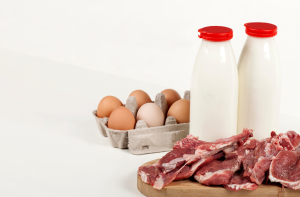Truth be told, the Torah prohibition of eating meat and milk applies only when they were actually cooked together. (In that case, not only the eating, but the cooking itself is forbidden by the Torah. If they were cooked together, even deriving benefit from the mixture is forbidden, such as feeding it to a pet) Strictly speaking, even to eat a deli sandwich of meat and cheese would not break the Torah law, as it was not cooked together.
Since, however, when we eat meat and cheese together it is very easy to come to cook them together, especially since we can and do cook either of the two on its own, the Sages instituted a system of Rabbinical prohibitions of mixing meat and milk. These Rabbinic “fences” set out to accomplish a greater degree of separation between meat and milk, to ensure no mistakes are made in their being cooked together or consumed once cooked. This is especially important as cooking meat in a milk vessel or vice-versa, if used for the former within 24 hours, is tantamount to cooking meat and milk together even on the Torah level.
The foundation of the system of Rabbinical prohibitions is to not consume meat and milk together, i.e. the deli sandwich, as consumption of meat and milk together would most likely lead to their being cooked together. They went one step further and required a separation between their times of eating, to wait for a while after eating meat before consuming milk. This requirement applies only for milk after meat, not meat after milk. This is for two reasons:
- Meat takes longer to digest and therefore the taste of the meat is assumed to remain much longer. To consume milk while the taste of the meat is still strong would feel like eating them together, leading to a slippery slope of actually consuming them together and then cooking them.
- The second reason is that meat often remains stuck between the teeth, and eating milk while meat is still present is like eating them together.
Since milk products are digested faster and don’t remain between the teeth like meat does, the prohibition doesn’t apply to meat after milk (with the exception of some hard, aged cheeses of strong taste which Ashkenazic custom is to wait after them to eat meat). Some have a custom to wait for a half-hour or hour after milk before meat, based on a teaching of the Zohar.
The prevalent custom is wait 6 hours between meat and milk, which is the opinion of the Code of Jewish Law. There were different customs in Europe; in Holland the custom was to wait only one hour after meat and in Germany three hours. Some continue those customs until today, and they all have a basis in Halachic literature.
There are many intricacies within the structure and application of these laws, which would not be within the scope of this column to address.
As with all “Rabbinic fences,” besides the surface reason for the decree, there’s an underlying, more profound reason. The Kabbalistic understanding for the prohibition of mixing meat and milk is that meat and the color red, signify Din or G-d’s trait of strict judgement. Milk, with its white color, represents G-d’s trait of Chesed, loving kindness. Only G-d Himself has the ability to mix these two traits when he deems it proper, but we cannot do so, and therefore keep them at a distance.
Sincerely,
Rabbi Yerachmiel Fried



